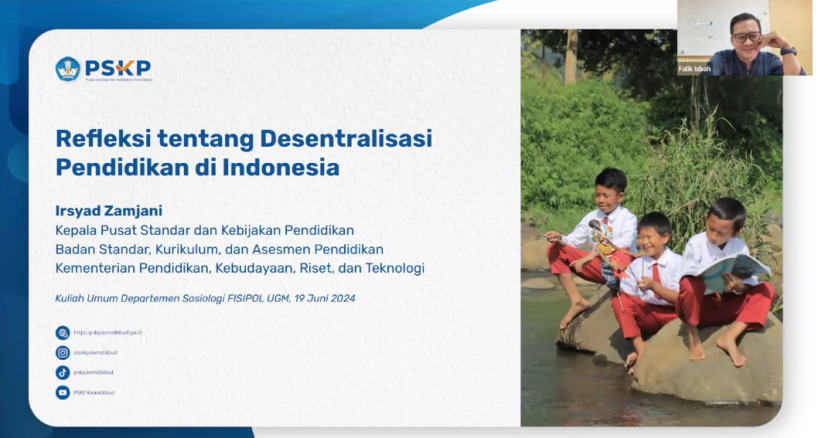
Yogyakarta, June 19th 2024─In a guest lecture organized by the Master of Sociology Program of UGM, Irsyad Zamjani, Head of the Center for Educational Standards and Policy of the Ministry of Education and Culture, explained several considerations of decentralization of education in Indonesia.
Decentralization, or the transfer of authority in making decisions, is carried out with the aim of distributing power and reducing bureaucratic complexity because it seeks to bring service recipients closer. It also supports the 16th Sustainable Development Goal (SDG) of strengthening peace, justice and resilient institutions.
In the field of education, the authority of actors at the center, which initially had different goals from actors in the regions, was synergized in the same system so that they could build a common vision.
“The success of education decentralization depends on the extent to which aspirations, capacity, work culture, and political affiliation can be translated into an interrelated management system,” said Irsyad.
Decentralization of education cannot stand alone because it is integrated in other decentralized systems that support each other, such as the political system, economic system, and institutional system. The education system in Indonesia decentralizes with three main considerations.
First, on the managerial aspect, Indonesia still has a bureaucracy that is too complex. This complex bureaucracy can be seen from the division of tasks and functions in the governance of managing institutions, which is inefficient.
“In general, education is managed by two ministries: the Ministry of Education and Culture for the curriculum, and the Ministry of Home Affairs, which manages the resources, because it includes the local government bureaucracy. This makes the bureaucracy complex,” Irsyad adds.
Second, political reasons. Given that decentralization emerged during reformasi, it seeks to address democratization and power sharing.
Third, institutional reasons related to the legitimacy crisis. Globally, centralized education governance arrangements are no longer relevant, so Indonesia has adopted a decentralized governance system.
With the sharing of power in education management, attention to education issues has increased and it has become the most politically popular sector.
However, the decentralization of education in Indonesia has not worked well. Education policies in the regions are dominated by populist policies that are not always in line with quality improvement. Thus, mitigation initiatives are needed to overcome decentralization such as strengthening school autonomy and opening up public participation to encourage discussions on quality improvement.
This event was organized by the Social Policy Analysis course and became a manifestation of the 4th SDG, namely creating quality education.
